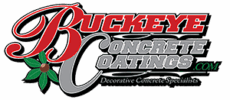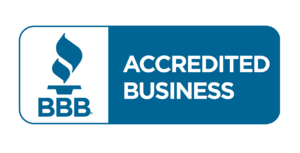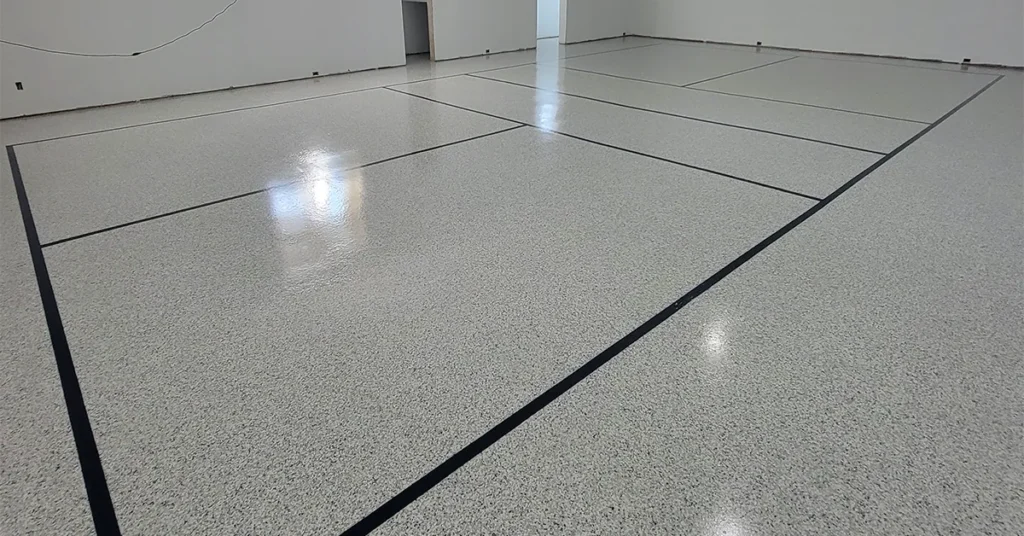Are you tired of dull, cracked, or stained floors in your home? Residential epoxy flooring might be the perfect solution! This durable, stylish, and easy-to-maintain flooring option is gaining popularity among homeowners. Unlike traditional flooring, epoxy coatings create a seamless, high-gloss finish that resists damage from daily wear and tear. Whether you’re upgrading your garage, basement, or even your kitchen, epoxy flooring offers a modern look with unbeatable durability. In this guide, we’ll explore the benefits of residential epoxy flooring, how it’s installed, and a detailed residential epoxy flooring cost breakdown. By the end, you’ll know if epoxy flooring is the right choice for your home!
Why Choose Residential Epoxy Flooring?
Residential epoxy flooring is a special coating made from resin and hardeners that chemically bond to concrete, creating a rock-solid surface. Homeowners love it because it transforms old, worn-out floors into sleek, high-performance surfaces. Unlike tile or hardwood, epoxy doesn’t crack or warp over time, making it ideal for high-traffic areas. It’s also resistant to oil, chemicals, and moisture, which is why it’s a top pick for garages and basements. Plus, with endless customization options, you can choose colors, patterns, and textures to match your home’s style.
Let’s dive deeper into the key benefits:
Super Strong & Long-Lasting
Epoxy floors are incredibly tough, resisting scratches, dents, and heavy impacts from dropped tools or furniture. Unlike vinyl or laminate, which can peel or fade, epoxy maintains its shine for years. It’s also resistant to UV rays, so it won’t yellow in sunlit rooms. Many epoxy floors last 15-30 years with proper care, making them a smart long-term investment.
Easy to Clean & Maintain
Spills and stains wipe right off since epoxy is non-porous. No more scrubbing grout lines like with tile! A simple mop or damp cloth is all you need for daily cleaning. Unlike carpet, it won’t trap dust or allergens, making it great for allergy sufferers. For tougher stains, mild soap and water do the trick without damaging the surface.
Safe & Slip-Resistant
Wet floors can be dangerous, but many epoxy coatings include anti-slip additives for better traction. This makes them safer for kids, pets, and elderly family members. Some even meet commercial-grade slip resistance standards, perfect for laundry rooms or entryways.
Endless Design Options
Want a glossy, mirror-like finish? Or maybe a speckled “flaked” look? Epoxy can be customized with metallic pigments, colored chips, or even 3D effects. You can match your home’s décor or create a bold statement floor. Some homeowners even add logos or patterns for a unique touch!
Cost-Effective in the Long Run
While the upfront residential epoxy flooring cost may be higher than paint or vinyl, its durability means fewer repairs. You won’t need to replace cracked tiles or refinish scratched wood. Epoxy stays looking new with minimal upkeep. Over time, this saves money on maintenance and replacements.
How Is Residential Epoxy Flooring Installed?
Installing epoxy flooring is a multi-step process that requires precision. While some DIYers attempt it, only professionals ensure the best results. Here’s a detailed breakdown of each step:
Step 1 – Profile & Grind
Our team of experts meticulously preps your floor using our commercial-grade, hardness-specific diamond grinders. Our vacuum systems minimize dust to maintain a clean working environment.
Step 2 – Repair & Prepare
We use 100% solids to patch any cracks, joints, or pitted areas of your concrete, creating a perfectly smooth surface for our base coat application.
Step 3 – Basecoat Application
Once your surface is fully prepped, we apply our Industrial-Grade self-priming basecoat, which completely soaks into and adheres to your concrete slab.
Step 4 – Full Flake Broadcast
Flakes of your color choice are generously hand-broadcast for an even, colorful, and robust surface. The flakes are then rolled into the base coat to ensure evenness and maximum adhesion.
Step 5 – Excess Flake Removal
Once sufficiently cured, all loose and excess flakes are scraped away from your surface, followed by complete removal with our commercial-grade blowers and vacuums.
Step 6 – Topcoat Application
Once the above steps are complete, your coating is finalized by an even application of our 100% UV-stable, Industrial-Grade topcoat.
Residential Epoxy Flooring Cost: What to Expect
The residential epoxy flooring cost varies based on materials, labor, and design complexity. Here’s a closer look at what influences pricing:
If you’re hiring a professional, labor will be a significant part of the cost. However, you get the benefit of expert installation, which often includes a warranty. If you go the DIY route, you’ll save on labor, but you’ll need to invest time, tools, and energy to get it right.
Factors Affecting Cost
- Floor Size – Larger areas cost more but may have lower per-square-foot rates.
- Floor Condition – Cracked or uneven concrete requires extra prep work, increasing labor costs.
- Epoxy Type – Basic single-coat epoxy is cheaper than multi-layer decorative systems.
- Labor Costs – Professional installation ensures quality but adds to the total price.
- Location – Prices vary by region due to material availability and labor rates.
DIY vs. Professional Epoxy Flooring Installation: Which Is Right for You?
Deciding between DIY and professional installation for your residential epoxy flooring depends on your budget, skill level, and project expectations. Below, we break down the pros and cons of each approach to help you make the best choice.
Pros of DIY Epoxy Flooring
Cost Savings – If you do it yourself, you can save on labor costs. Professional installation can double or triple your total expense, while DIY materials may cost less, however, the results with DIY might not be what you hope for.
Satisfaction & Customization – Applying epoxy yourself can be rewarding if you enjoy hands-on projects. You have full control over colors, patterns, and finishes, allowing for a truly personalized look.
Flexible Timeline – Unlike contractors who work on a schedule, DIY lets you complete the project at your own pace. However, keep in mind that epoxy has a limited pot life (working time) once mixed, so you must work efficiently during application.
Learning Experience – Tackling an epoxy flooring project can teach valuable home improvement skills. Many online tutorials and kits make the process beginner-friendly.
Cons of DIY Epoxy Flooring
Risk of Mistakes – Epoxy is unforgiving; improper mixing, uneven application, or poor surface prep can lead to bubbles, peeling, or an uneven finish. Fixing errors often requires grinding, starting over, and reapplying the coating, increasing costs.
Time-Consuming Process – Proper preparation (cleaning, repairing cracks, grinding) can take a full day or more. Applying epoxy itself is labor-intensive, especially for large areas.
Safety & Ventilation Requirements – Epoxy fumes can be strong and hazardous, requiring proper ventilation, gloves, goggles, and a respirator. Working in confined spaces (like garages) without adequate airflow can be dangerous.
Limited Warranty – Most DIY epoxy kits do not come with long-term warranties, meaning you bear the risk if the floor fails prematurely.
Why Hire a Professional?
While DIY can save money upfront, professional installers offer higher quality, durability, and peace of mind. Benefits include:
Flawless Application – Experts ensure proper mixing, even coating, and seamless finishes.Advanced Techniques – Professionals use industrial-grade tools and high-performance epoxy blends.
Time Savings – A pro crew can complete the job in 1–2 days, whereas a DIY may take longer.
Warranty Protection – Many contractors may offer lifetime warranties for their garage floor coatings, while some may offer 5–10-year warranties for other application areas, covering defects and premature wear.
Professionals guarantee a smooth, long-lasting finish with expert-level precision that’s hard to achieve with DIY kits. They use industrial-grade tools and commercial-grade epoxy formulations for superior durability and shine. Contractors can also identify and fix potential issues like moisture seepage or cracks before they ruin your floor.
FAQs
What is residential epoxy flooring?
Residential epoxy flooring is a durable, high-performance coating made from resin and hardeners that bond to concrete. It creates a seamless, glossy surface that is resistant to stains, cracks, and heavy foot traffic. Commonly used in garages, basements, and kitchens, it offers both protection and aesthetic appeal. Homeowners love it for its long lifespan (15-30 years with proper care) and low maintenance.
How much does residential epoxy flooring cost?
These coatings, when professionally installed, typically have varying costs, depending on the type of floor, and can last 15-30+ years with minimal maintenance, reducing the need for costly repairs and replacements.
Is epoxy flooring worth the investment?
Yes! While the upfront cost is higher than paint or vinyl, epoxy lasts decades with minimal upkeep. It resists stains, chemicals, and heavy impacts, saving money on repairs. Plus, it boosts home value, especially in garages and basements. Compared to tile or hardwood, it’s more affordable long term.
Can I install epoxy flooring myself?
DIY is possible but challenging. Improper mixing or application can lead to peeling or bubbles. Prep work (cleaning, grinding) is time-consuming, and fumes require safety gear. For best results, hire a pro, as they ensure a flawless, warranty-backed finish.
How long does epoxy flooring last?
With proper care, epoxy floors last 15–30 years. High-traffic areas may need a fresh topcoat every 5–10 years. Avoid harsh chemicals and dragging heavy objects to extend their lifespan. Professional installations often come with warranties up to a lifetime for added peace of mind.
Where can epoxy flooring be installed in a home?
Epoxy works in garages, basements, kitchens, living spaces, and commercial spaces. It’s ideal for areas needing durability, easy cleaning, and moisture resistance. Avoid outdoor use (unless UV-resistant) and rooms with extreme temperature changes, as epoxy can expand/contract.
Final Thoughts
If you want a durable, low-maintenance, and stylish floor, residential epoxy flooring is an excellent choice. It’s perfect for garages, basements, kitchens, and even living spaces. While the residential epoxy flooring cost varies, its long lifespan and easy upkeep make it a smart investment.


